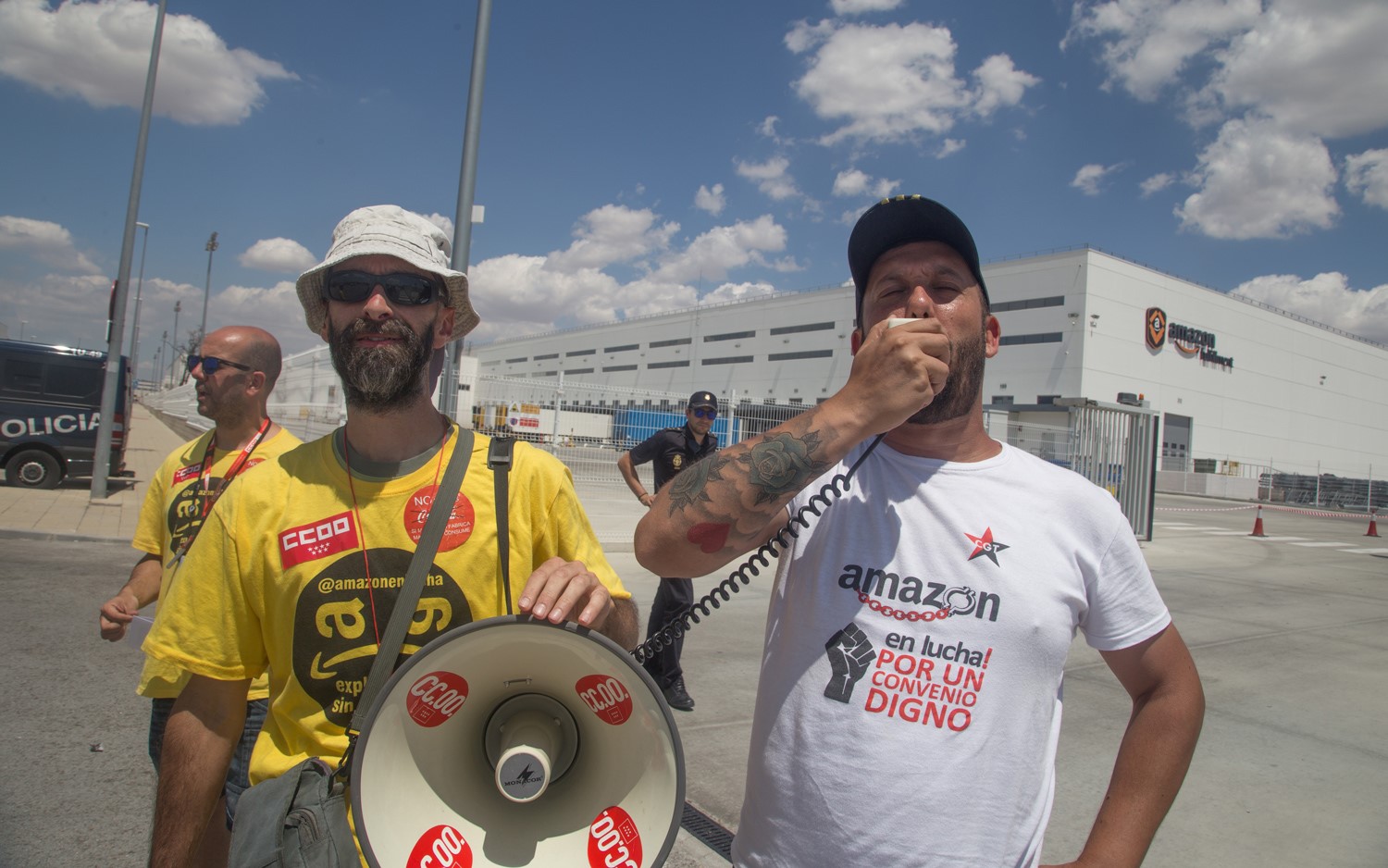Amazon Prime Day Is a Trap — Don't Fall for It
Amazon Prime Day isn't just a collection of cheap products; it's a suicide pact with the entire consumer-goods marketplace.
In his excellent piece "I'm Skipping Prime Day 2018," my colleague Louis Ramirez outlines a list of very sensible reasons why he's declining to take part in Amazon's annual fire sale. He explains (correctly) that the goods on sale are outdated, you'll get better prices later this year and the whole thing is a smokescreen to sell Prime Memberships.

But there's actually an even stronger reason to skip Prime Day this, and every, year: it's a suicide pact with the entire consumer-goods marketplace.
MORE: The Best-Selling Products from Prime Day (So Far)
There's no nice way to say this: Amazon promotes a number of harmful business practices, and the money you spend on the site ultimately lines the pockets of a profoundly out-of-touch CEO.
From worker rights, to sustainable business practices, to participation in government, Amazon has routinely and repeatedly put its bottom line ahead of the welfare of both its employees and its customers.
"This can be easy to miss in a one-day marketing blitz like Prime Day, but as Amazon grows, it's really crucial to start grappling with the impact of the company," said Olivia LaVecchia. LaVecchia is a senior researcher at the Institute for Local Self-Reliance: a consumer and worker advocacy organization that explores the relationships between consumers, businesses and communities. "We, as citizens, and our public officials need to start doing something about it."
While it may hurt to lose out on a great deal or two, you ultimately have a choice about when — and whether — to shop at the online superstore.
The workers' strike
For the last two years, Prime Day has been a big sale on almost everything Amazon sells: no more, no less. This year, however, the calculus is a little different, thanks to a well-organized worker's strike. Thousands of Amazon workers in Europe have refused to work during Prime Day, citing "tough working conditions [that] are driving more and more workers to rebel against [Amazon]."
The employees' fears seem well-founded. In a call-to-arms from a Spanish workers' rights group called Amazon en Lucha, they cite unlivable wages in Poland, abrogation of worker rights in Germany, unreasonable timetables in France, poor warehouse conditions in Spain and unreliable contracts in Italy.
The English-speaking world is not exempt from Amazon's often-inhospitable treatment of warehouse workers. In an Indiana warehouse, dying on the job is a real possibility. As far back as 2011, the Occupational Safety and Health Administration investigated Amazon warehouses in Pennsylvania. After 15 workers collapsed on the job, OSHA measured a heat index of more than 100 degrees.
That could have been a wake-up call for the company, but matters seem to have deteriorated since then. In November 2017, London's Mirror newspaper sent a reporter underground at an Amazon warehouse in the U.K. He discovered pauper's wages (seven pence per item shipped), stingy bathroom breaks, homelessness among workers, frequent injuries, exhausting physical strain and — perhaps most damning of all — a general sense that management thought the status quo was just fine.
The Spanish and German workers have not explicitly called for a Prime Day boycott to coincide with their strike, but it's easy enough to extrapolate from their position. Withholding your dollars during a workers' strike could send a powerful message to Amazon.
It's a little discouraging, then, to see that Prime Day has, so far, been even more lucrative for Amazon than ever before. With numbers like that, Amazon may not see much value in reevaluating its relationship with its low-level workers. But at least we got to look at some cute dogs.
A spacey CEO
Jeff Bezos is now worth more than $150 billion, making him arguably the single richest man in the world. To put this in perspective: The average Amazon warehouse worker in the United States, whose contract is likely bare-bones temporary, makes an estimated $13 per hour. (Amazon does not provide exact numbers.) To become as wealthy as Jeff Bezos, an averagely paid Amazon warehouse worker would have to put in 11,538,461,539 hours on the job — approximately 1.4 million years. That's the same amount of time between Homo erectus first setting foot in Europe and today.
Bezos is likely aware of the deplorable conditions of his company's warehouses; after all, there's no shortage of investigative articles about them. Yet rather than use his vast fortune to pay his employees a fair wage, Bezos' plan is to take rich people to outer space for $300,000 a pop. He has, in fact, explained that space travel is the "only way" to spend the vast amount of money he's accrued.
The simple fact is that you can't amass that kind of fortune without passing on some of the cost to the taxpayer. In 2017, Amazon turned a $5.6 billion profit, but paid no taxes on it. Economists estimate that the company has probably avoided an additional $20.4 billion in U.S. taxes over the years, all while taking $1.4 billion in tax incentives.
In spite of this, a not-insignificant percentage of Amazon employees may qualify for food stamps. In other words, Bezos is asking both the U.S. government and the American public to subsidize his wealth, whether or not they shop at Amazon.
Make no mistake: If you spend a lot of money on Prime Day, a lot of it is going to find its way back to the richest man on Earth rather than the sometimes-impoverished workers who fulfilled your order. Something about that smacks of unfairness.
The future of commerce
None of this touches on the biggest issue of the biggest cost of doing business with Amazon, however: Its bargain-bin prices are probably not sustainable.
To simplify an extremely complex issue, Amazon's dominance in the online marketplace might constitute a monopoly. The company's extreme influence allows it to strongarm suppliers and artificially deflate prices on certain goods.
That's good for consumers in the short-term — who doesn't like cheap stuff? — but it doesn't take an economist to figure out what happens next.
As a single business monopolizes a large segment of its market, it's able to offer its goods at incredibly cheap prices. After all, if a company is selling great quantities of goods, it can lower the price on individual goods and continue to rake in money through sheer volume. (This is why things are so cheap at Wal-Mart.)
Such a arrangement is obviously good for the company itself and usually makes consumers happy for a while. But it also drives competitors out of business, which is not healthy for anyone in the long run.
"Amazon's whole thing with Prime is that they want people to go to Amazon first, and get locked in as Amazon customers," LaVecchia said. "Even if we're just thinking about ourselves as consumers, there are costs to Amazon's dominance.
"We know that Amazon uses its data on what we browse and buy to shape what we see, and adjust prices accordingly … Amazon's control over suppliers and power over the producer is increasingly influencing what products make it to market."
Decreased consumer choice isn't the only potential consequence. Even now, LaVecchia explained, Amazon doesn't always have the lowest price. But as it locks people into its ecosystem through Prime Memberships and similar incentives, it could cost even more to shop there in the future.
Aside from automobiles, it's hard to think of a product that Amazon doesn't sell. Although the company made a name for itself as an online bookseller, you can now get everything from laptops to streaming video. The company owns IMDb, Audible, Twitch and even Whole Foods. Bezos himself bought The Washington Post.
This incredible range of goods and services has had a profound effect on local economies. Inhabitants of small, remote towns can't say no to Amazon's low prices, which can backfire when local retailers fail and Amazon becomes the only provider in town. (And yes, Amazon has quietly used this leverage to build up quite a bit of power in local governments.)
Having the option to shop at a Prime Day sale is one thing. Being forced to do so because Amazon is the only retailer available sounds less appealing.
Caveat emptor
LaVecchia explained to Tom's Guide that Amazon's digital hegemony doesn't just affect workers and consumers; the influence can extend to entire communities.
"We've been looking closely at Amazon for a long time," LaVecchia said, "and what we see is that as Amazon expands, it plays a role in increasing economic inequality, and decreasing economic opportunity.
"When small businesses are closing and having a harder time starting, that impacts those business owners who once could have created a livelihood. It also impacts the people they employ, and the communities they're based in — the ways we all benefit from having a distributed economy, and distributed economic power."
But when it comes to strong sentiments about Prime Day, a statement from The United Food and Commercial Workers may have put it best. The UFCW is one of the most influential retail unions in the United States, and it minced no words:
"Hard-working families don’t need more deals from Amazon – they need reassurances that this company isn’t going to destroy more American jobs," said Marc Perrone, president of the UFCW. "Our society needs to talk less about Amazon’s Prime Day sales and more about the serious economic danger Amazon poses to every community in America."
Sign up to get the BEST of Tom's Guide direct to your inbox.
Get instant access to breaking news, the hottest reviews, great deals and helpful tips.
Marshall Honorof is a senior editor for Tom's Guide, overseeing the site's coverage of gaming hardware and software. He comes from a science writing background, having studied paleomammalogy, biological anthropology, and the history of science and technology. After hours, you can find him practicing taekwondo or doing deep dives on classic sci-fi.

